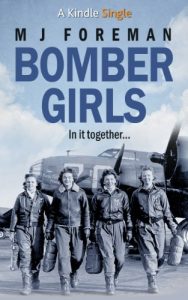Their finest hour…
In 1939, with Britain fighting for its life against Nazi Germany, the Air Transport Auxiliary was formed to back up the Royal Air Force.
All of its pilots were men.
But by 1940, after Fighter Command lost hundreds of pilots during the Battle of Britain, Winston Churchill realised the recruitment pool needed to be widened.
In stepped ATA Senior Commander Pauline Gower, who had been a famous flier before the war.
When Gower and ATA founder Gerard ‘Pop’ d’Erlanger discussed the idea of women flying in the ATA she answered the question ‘why women?’ with ‘why not?’
These women pilots were to become the Bomber Girls.
By the end of the War, 166 extraordinarily brave young women learned to laugh off morale-crushing socio-political taboos in a bid to help Britain in its hour of need. Among them was the world-famous aviatrix and socialite Amy Johnson who, in 1930 had made a pioneering solo flight, from Britain to Australia.
But most were ordinary girls, who nonetheless counted themselves the equal of any man, and were willing to face death to defeat the enemy.
Unlike the male pilots, they had none of the firepower to defend themselves against enemy attack; neither had they been taught any specific manoeuvres that might save their lives if they were shot at.
Their orders from the commanders at the ATA ferry pools were simple and straightforward: stay on course, try not to fly above 800 feet in bad weather, and don’t try anything fancy.
But their fight was not just against the Nazis. It was also against the male establishment of the Armed Forces.
Thanks to the political guile of Miss Gower they were the first collective of women to earn the same salary as their male colleagues doing the same job.
Even so, it was only in 2008 that women of the ATA were rewarded with medals for their outstanding work and heroism during the war years.
Bomber Girls is the inspiring account of the achievements of those 166 women during the Second World War, not only in defending their country, but in breaking new ground for women’s rights. Based on exclusive interviews with the veterans of those harrowing years, it is a brilliantly told story of the War’s heroines.
M J Foreman is a journalist, writer and editor with a varied experience in newspapers, broadcasting, and communications. Her books include So You Think You Know Canterbury? and Kent Revisited.
In 1939, with Britain fighting for its life against Nazi Germany, the Air Transport Auxiliary was formed to back up the Royal Air Force.
All of its pilots were men.
But by 1940, after Fighter Command lost hundreds of pilots during the Battle of Britain, Winston Churchill realised the recruitment pool needed to be widened.
In stepped ATA Senior Commander Pauline Gower, who had been a famous flier before the war.
When Gower and ATA founder Gerard ‘Pop’ d’Erlanger discussed the idea of women flying in the ATA she answered the question ‘why women?’ with ‘why not?’
These women pilots were to become the Bomber Girls.
By the end of the War, 166 extraordinarily brave young women learned to laugh off morale-crushing socio-political taboos in a bid to help Britain in its hour of need. Among them was the world-famous aviatrix and socialite Amy Johnson who, in 1930 had made a pioneering solo flight, from Britain to Australia.
But most were ordinary girls, who nonetheless counted themselves the equal of any man, and were willing to face death to defeat the enemy.
Unlike the male pilots, they had none of the firepower to defend themselves against enemy attack; neither had they been taught any specific manoeuvres that might save their lives if they were shot at.
Their orders from the commanders at the ATA ferry pools were simple and straightforward: stay on course, try not to fly above 800 feet in bad weather, and don’t try anything fancy.
But their fight was not just against the Nazis. It was also against the male establishment of the Armed Forces.
Thanks to the political guile of Miss Gower they were the first collective of women to earn the same salary as their male colleagues doing the same job.
Even so, it was only in 2008 that women of the ATA were rewarded with medals for their outstanding work and heroism during the war years.
Bomber Girls is the inspiring account of the achievements of those 166 women during the Second World War, not only in defending their country, but in breaking new ground for women’s rights. Based on exclusive interviews with the veterans of those harrowing years, it is a brilliantly told story of the War’s heroines.
M J Foreman is a journalist, writer and editor with a varied experience in newspapers, broadcasting, and communications. Her books include So You Think You Know Canterbury? and Kent Revisited.






